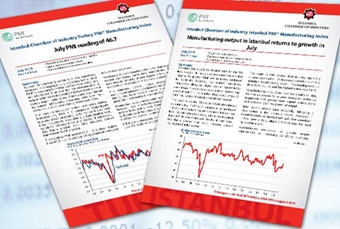News
Istanbul Chamber of Industry Announces Türkiye and Istanbul Manufacturing PMI July 2019 Reports
- 01.08.2019
- News

Istanbul Chamber of Industry Türkiye Manufacturing PMI (Purchasing Managers Index), the most reliable reference for the manufacturing industry’s performance that is the leading indicator of economic growth was recorded as 46,7 in December and thus indicated that the business conditions of the sector maintains the deceleration. While the slowdown in new orders has been continuing, the slowdown in manufacturing was at the minimum rate observed since March. Input inflation receded for second successive month and increase in final product prices was at the minimum rate in the last five months.
Istanbul Chamber of Industry Istanbul Manufacturing PMI was reached in the highest level of the last one year with 49,6 in June and indicated that the business conditions of the İstanbul manufacturing sector were close to balance.
The results of the ICI Türkiye and Istanbul Manufacturing PMI surveys, the fastest and the most reliable reference for the manufacturing industry's performance that is the leading indicator of economic growth, were declared for the term July 2019. According to the survey results where any figure above the threshold of 50 is an indication of improvement in the industry, Turkish Manufacturing Industry PMI which was measured as 47.9 in June dropped to 46.7 with a slight decline and indicated a moderate slowdown in business conditions.
Especially slowdown in total new orders continued due to particularly the challenging market conditions in the domestic market. This slowdown occurred despite of the new export orders expanded in previous month and continued stable progress in July. The relatively positive picture in export encouraged some manufacturers to increase their manufacturing in July. As a result, the slowdown in manufacturing was at the minimum rate observed since March. Manufacturing requirements continued to decline. This caused the recruitment and purchasing activities to decline. Slowdown in input purchases and sufficient supplier stocks contributed in the improvement observed in delivery times for the first time in the last 27 months. Inflationary pressure showed indications of decline in July. While input costs continued to increase, output inflation receded for second successive month and realized behind the serial average. Similarly, the increase in final product prices was at the minimum rate in the last five months and significantly below the levels of this time last year.
Andrew Harker, Deputy Director of Markit, who evaluated survey data of Istanbul Chamber of Industry, Türkiye Manufacturing PMI, said: “In the last PMI survey, Turkish manufacturer gave confusing signals. On one hand, with the slowdown in total new orders, demand conditions continued to remain challenging in July. On the other hand, the fact that exports gained stability provided a more moderate slowdown in manufacturing. PMI data indicating a decline trend in inflationary pressure in last month lead up to the interest deduction of Central Bank of the Republic of Türkiye in July.”
İstanbul Production PMI increased to 49.6 in July
Istanbul Chamber of Industry Istanbul Manufacturing PMI which was measured as 46,5 in June was realized as 49,6 in July and indicated that the business conditions of the İstanbul manufacturing sector were close to balance. Moreover, the index was recorded in the highest level since July 2018
The information based on anecdotes indicated that the increase in new export orders is the key factor providing the manufacturing to step into the growth region. New export orders showed a moderate increase after the balancing in the previous month. Slowdown in the new orders realized at the minimum rate observed in the last one year. Manufacturers responded to the increase in manufacturing requirements in July by increasing the number of workforce. Job creation rate is strong and realized in the highest level observed since March 2018. Inflationary pressure declined in July. Despite the increase in input costs, the last increase realized at the lowest level observed since February. Inflation of final goods prices receded in the second successive month. Slowdown rate in purchasing activities, input previous month.